 Petzlover
Petzlover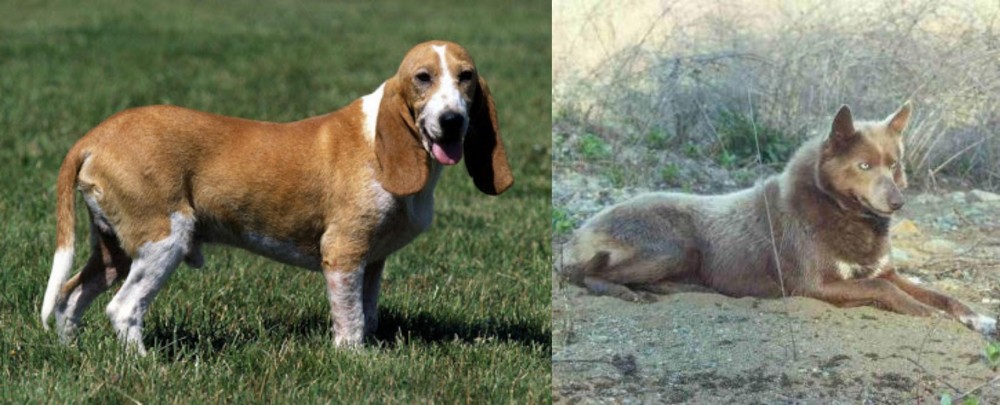 Schweizer Niederlaufhund is originated from Switzerland but Tahltan Bear Dog is originated from Canada. Both Schweizer Niederlaufhund and Tahltan Bear Dog are of same height. Schweizer Niederlaufhund may weigh 6 kg / 14 pounds more than Tahltan Bear Dog. Both Schweizer Niederlaufhund and Tahltan Bear Dog has almost same life span. Both Schweizer Niederlaufhund and Tahltan Bear Dog has almost same litter size. Both Schweizer Niederlaufhund and Tahltan Bear Dog requires Low Maintenance.
Schweizer Niederlaufhund is originated from Switzerland but Tahltan Bear Dog is originated from Canada. Both Schweizer Niederlaufhund and Tahltan Bear Dog are of same height. Schweizer Niederlaufhund may weigh 6 kg / 14 pounds more than Tahltan Bear Dog. Both Schweizer Niederlaufhund and Tahltan Bear Dog has almost same life span. Both Schweizer Niederlaufhund and Tahltan Bear Dog has almost same litter size. Both Schweizer Niederlaufhund and Tahltan Bear Dog requires Low Maintenance.
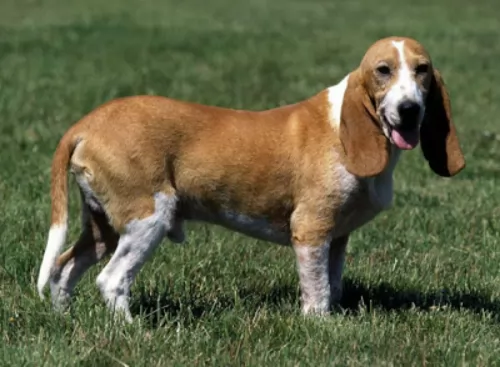 Originating in Switzerland, the Schweizer Niederlaufhund was established around 1900, when hunting became restricted to districts. The Swiss hunter needed a slower dog for the limited territory they could hunt in. Crossing selected Schweizer Laufhunds with Basset Hounds and other selected smaller, short legged hounds developed the Schweizer Niederlaufhund. By 1905 there was already a Schweizer Niederlaufhund Club.
Originating in Switzerland, the Schweizer Niederlaufhund was established around 1900, when hunting became restricted to districts. The Swiss hunter needed a slower dog for the limited territory they could hunt in. Crossing selected Schweizer Laufhunds with Basset Hounds and other selected smaller, short legged hounds developed the Schweizer Niederlaufhund. By 1905 there was already a Schweizer Niederlaufhund Club.
The Niederlaufhund became one of the best hunting dogs in the world, with its powerful body and ability to outhunt the Laufhund in tracking big game. Slower of course than the Laufhund it has a great sense of smell and an ability to easily find wounded animals. There are a few varieties, just like with the Swiss Hound again mostly because of their coloring. The Luzerner Niederlaufhund, the Jura Neiderlaufhund, and the Schwyzerlaufhund. They have musical voices that they use to communicate with the hunters and each other as well as that amazing sense of smell. They can hunt for hours without tiring and without much information from the hunter.
They are a cross breed not recognized by the larger kennel club such as the AKC and the UKC. They are recognized by the Dog Registry of America, Inc. (DRA), the American Canine Association Inc. (ACA) and most importantly by the Federation Cynologique Internationale (FCI). This last one is important because it could lead to recognition as a new breed by the UKC and the AKC.
 The primitive Tahltan Bear Dog comes from Canada. The dog was developed by the Tahltan people to hunt bears, so you can imagine he was a strong, brave dog.
The primitive Tahltan Bear Dog comes from Canada. The dog was developed by the Tahltan people to hunt bears, so you can imagine he was a strong, brave dog.
They also had fox-like yaps that confused bears until the hunter could come and kill the bear. These dogs are descended from pariah-type dogs with their diet being birds and fish.
It was in 1988 that the Canadian Post Office honoured the Tahltan Bear Dog by having a picture of it appearing on a stamp.
Some people claim that after the 1960s there are no longer any living descendants while others say that breeding projects were established and that there are still a few of these dogs around today. There are records on the other hand that claim the dog became extinct in the 1970s.
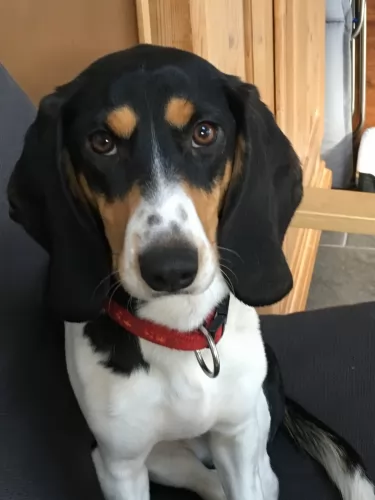 The Schweizer Niederlaufhund is a medium size, short dog. They look like their cousins, the Schweizer Laufhund but smaller. Their body is just slightly longer than it is tall, so you are left with the impression of a mostly square dog. The Niederlaufhund is well put together, with strong legs, a noble head, long droopy ears, broad chest, and a low held tail.
The Schweizer Niederlaufhund is a medium size, short dog. They look like their cousins, the Schweizer Laufhund but smaller. Their body is just slightly longer than it is tall, so you are left with the impression of a mostly square dog. The Niederlaufhund is well put together, with strong legs, a noble head, long droopy ears, broad chest, and a low held tail.
The Small Lucerne Hound has a white cote with smooth speckles of black or gray making them appear to be blue.
The Small Bernese Hound has a tricolor coat of white, tan and black. There are tan marks on the eyebrows. There is a wire haired Small Bernese as well. He has a short beard.
The Small Schwyz Hound is smooth coated in white with orange or yellow-red patches. The wired haired version is extinct.
The Small Jura Hound is a single coated dog with a black coat and tan marking above his eyes as eyebrows as well. He might have some white as well.
 Not like a bear, but more foxy in appearance or even more like a husky, the Tahltan Bear dog is medium sized, standing at between 36 – 43cm in height and weighing between 6 – 9 kg.
Not like a bear, but more foxy in appearance or even more like a husky, the Tahltan Bear dog is medium sized, standing at between 36 – 43cm in height and weighing between 6 – 9 kg.
It is believed that they were similar to spitz and pariah type dogs, and were athletic. The short to medium length coat of the dog was mainly black or brown with some white.
He had fairly large pointed, erect ears and also a fairly pointed muzzle. The tail was interesting and was short and furry and always carried erect.
The Tahltan Bear Dog is fearless, not being deterred when meeting large bear. It's why the dog has been valued by hunters – their bravery and fearlessness.
They’re great family dogs too and will get on well with children. He is intelligent and easy to train if you want to give him training and socialization.
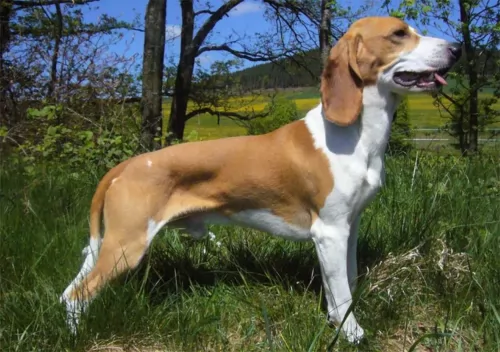 Children friendliness – yes, they are but use caution around small children and small prey.
Children friendliness – yes, they are but use caution around small children and small prey.
3. Adaptability - needs room to run and explore – is very frustrated when confined.
 Because some claim that this dog is extinct, there are only a few accounts of what he is actually like.
Because some claim that this dog is extinct, there are only a few accounts of what he is actually like.
Even though they were hunting dogs, they were devoted pets and companions of the people of the Yukon.
If these dogs are still to be found today, you will find them to be easy going, protective, loyal, intelligent, playful, alert, watchful and energetic. Just don’t allow them to get too hot as they prefer cooler climates.
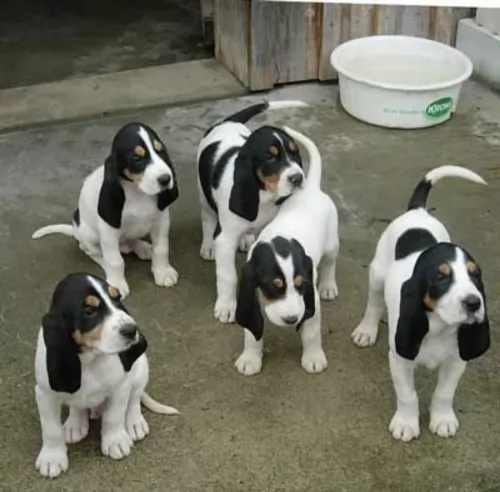 The Niederlaufhund Is prone to a very medical issues to keep an eye on. They include:
The Niederlaufhund Is prone to a very medical issues to keep an eye on. They include:
• Hip Dysplasia – This comes from hip joints that are not well formed and cause reduced mobility and pain. Parents can be tested before the dogs are bred to make sure their hips are good, and that dysplasia will not be passed to puppies. This dysplasia can cause arthritis and even lameness.
• Ear Infections – With long drooping ears it is easy for the dog to acquire ear infections. This is even more so for a hunting dog like the Niederlafhund. It is important to clean the dog’s ears on a regular basis.
 Healthy dogs are unlikely to pick up any of the many common dog illnesses there are. There are many – cancer, diabetes, bloat, hip dysplasia, ear infections, dental disease and many more.
Healthy dogs are unlikely to pick up any of the many common dog illnesses there are. There are many – cancer, diabetes, bloat, hip dysplasia, ear infections, dental disease and many more.
This is a contagious and infectious disease known as canine tracheobronchitis and which is transmitted through the air. Treatment is usually administered as a nasal spray, but your dog will need to get to the vet because of his dry, honking cough and lack of appetite.
This is a viral disease which in most instances is fatal. It is mostly transmitted when an animal that carries the disease bites the dog. Your dog develops behavior which is totally uncharacteristic of him. He'll also froth at the mouth and become aggressive. Death is nearly always guaranteed.
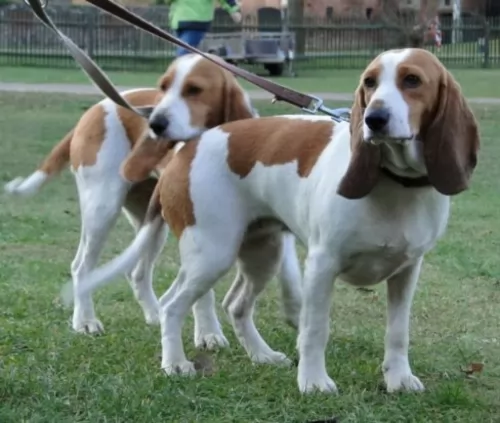 1Feeding the puppy - give 1 cup per day of high quality dog food divided into 3 meals.
1Feeding the puppy - give 1 cup per day of high quality dog food divided into 3 meals.
2.Feeding the adult – give one and one half cups of high quality dog food divided into 2 meals.
4. Games and Exercises – needs a lot of daily exercise and loves field trials, running and activities like barn hunt.
 This double coated hunting dog’s thick coarse coat will require brushing at least twice a week to free the dog of loose hair. He is regarded as a low mainenance dog.
This double coated hunting dog’s thick coarse coat will require brushing at least twice a week to free the dog of loose hair. He is regarded as a low mainenance dog.
During brushing, you would check inside his ears and make sure there are no signs of redness. Eyes of the dog should be bright, eager and free of discharge.Always keep the nails of the dog trimmed.
If you keep your pet outside for any lengths of time it is imperative that this dog has shade to lie down in as he doesn’t do well in too much heat.
Because he is a hunting dog, he is used to being outdoors and being active. He wont be content to lie around inactive for too long. He’ll want at least a walk every day and some ball games.
A pet dog can’t choose his own food so they depend on us to make the right choices for them. It’s always convenient to have a packet of commercially manufactured dog food available, but who knows if this dog, which some claim is extinct, ever ate commercially manufactured food.
If he did, you would want to mix it every now and again with home made food - boiled chicken, sweet potatoes, brown rice or pasta, carrots and spinach. This food could be chopped up and added to the dog’s kibble.